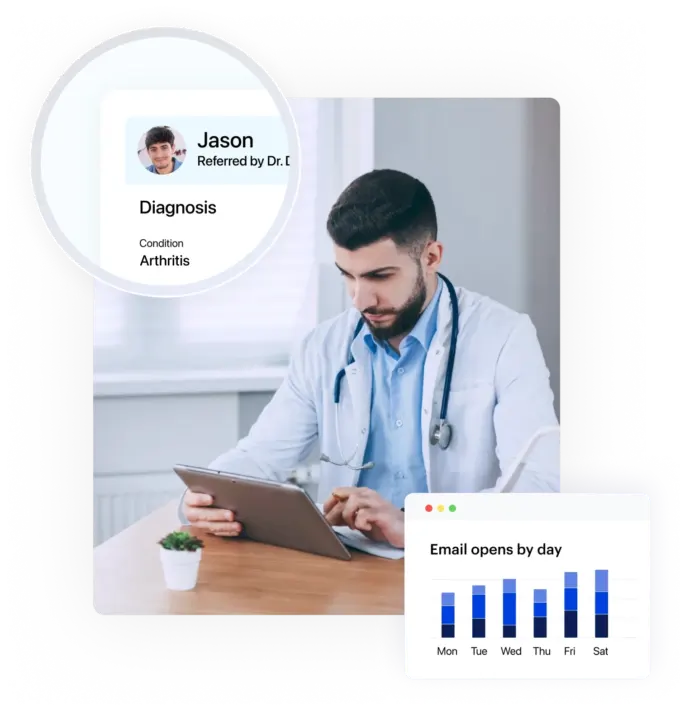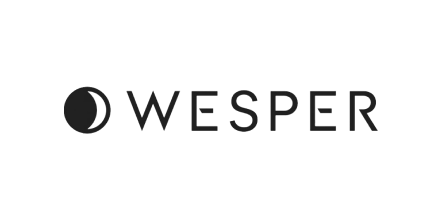CRM for Healthcare
A System Where No One Gets Lost
The fully customizable, HIPAA-compliant platform for streamlining intake, outreach, and tracking through a complete care plan.


We specialize in streamlining workflows and boosting engagement.




Features
Intake Automation
Keep new patients engaged and moving forward to their first appointment with personalized outreach that happens automatically… while giving your staff some much-needed work/life balance.
Referrals and Tracking
Seamlessly process incoming referrals, and follow patients throughout their journey, across every clinic they visit. Our HIPAA-compliant systems ensure it’s only seen by authorized caregivers.
Marketing Tools
Run all your campaigns, socials, blogs, and more from one central hub. Or segment your database to reach any specific group you want for clinical trials, new treatment opportunities, you name it.
Analytics
Pull data from all sources into our pre-made reports – or create your own, we don’t mind – to make informed decisions, grow your business, and see where your patients need you the most.
Administration
Hit the ground running with an interface that’s easy for anyone to pick up and use without creating any lag in response time. You can hire a specially trained admin if you want… but you won’t need to.
Fully Customizable
We completely build out your platform for you so it fits your specific needs. Then we provide training and world-class continuing care. It’s all part of the service.
Use all your existing tools from a centralized hub… or replace them entirely
with our tools to save yourself a few bucks.
Connect all of your teams by automating the application process. Integrate with built-in connectors to provide a complete picture to your teams. Centralize student data management.
Connect all of your teams by automating the application process. Integrate with built-in connectors to provide a complete picture to your teams. Centralize student data management.
How can I track different service interests (ABA, Speech, OT) for incoming patients?
When a clinic offers multiple services like ABA therapy, Speech Therapy, and Occupational Therapy, keeping track of what each incoming patient is seeking is essential for effective triage, scheduling, and follow-up.
Here’s how you can track service interests without letting things fall through the cracks:
Build digital intake forms that include checkboxes or dropdowns for service interest. Whether a patient needs just ABA or a combination of therapies, these preferences can feed directly into your CRM or ABA practice management software.
In platforms like LeadSquared, patient profiles can be automatically tagged or segmented based on selected services. This makes it easier to assign the right coordinators or clinicians and tailor communication accordingly.
Create service-specific intake workflows. For instance, an ABA intake might include a different set of forms, insurance checks, and scheduling needs than Speech or OT. Automating these steps based on service interest helps your team stay efficient.
Use dashboard views or filters to monitor how many patients are interested in each service over time. This can guide staffing, outreach, and service expansion.
With a connected intake and CRM system, tracking service interests effortlessly becomes part of your broader workflow.
What are the core benefits of a healthcare CRM?
A healthcare CRM centralizes patient data, automates scheduling and reminders, and supports HIPAA‑compliant communication via email, text, phone, and portals. It streamlines admin tasks and enhances personalized patient engagement.
What essential features should I look for in a healthcare CRM?
Prioritize: secure patient intake, EHR/EMR integration, automated appointment reminders, multi-channel communication, analytics dashboards, and compliance (e.g. HIPAA/GDPR). Mobile access and telehealth support are increasingly important.
How does a healthcare CRM support regulatory compliance and data security?
Top CRMs include encryption, audit trails, user authentication, secure messaging, and digital consents. They adhere to HIPAA (in the U.S.) and GDPR (in the EU), ensuring robust patient‑data privacy and legal safeguards.
How do CRMs integrate with existing EHR and billing systems?
Modern CRMs offer loss‑proof APIs and built‑in connectors for EHRs, billing platforms, and telehealth systems. Seamless integration prevents manual data entry, reduces errors, and enables unified workflows across admin and clinical teams.
How can healthcare practices improve patient communication about billing and scheduling?
Clinics can start by sending personalized appointment reminders via text, email, or phone call. These reminders should not only include the date and time but also explain any preparation steps or policies, like cancellation rules. Allowing patients to confirm, reschedule, or cancel appointments online gives them a way to communicate directly with the clinic without confusion.
For billing, staff should explain costs, co-pays, and out-of-pocket charges upfront and provide easy-to-read statements. A secure patient portal can help, but it works best when used as a communication tool, not just a storage system. For example, the portal can display bills along with short, clear explanations, so patients know exactly what each charge is for and why they owe it.
Training staff to communicate empathetically is also crucial. Finally, practices can collect feedback to see whether patients understand scheduling and billing instructions, then adjust their communication methods as needed.
How can CRM technology reduce no‑shows and improve patient retention?
By automating appointment reminders via SMS, email, and calls, and sending personalized follow‑ups or wellness content. CRMs also segment patients for re‑engagement campaigns, helping decrease no‑shows and boost loyalty.
Can healthcare CRM support marketing and revenue growth?
Yes. Modern CRMs enable targeted outreach based on demographics and behavior, track campaign ROI, support upselling services, and improve coordination across departments, driving both patient acquisition and retention.
What analytics and reporting capabilities do healthcare CRMs offer?
They provide KPIs like appointment trends, engagement metrics, dropout rates, and response to campaigns. Advanced platforms offer predictive insights—for example forecasting no‑shows or care needs, enabling proactive decision‑making.
What healthcare CRM features specifically benefit ABA clinics?
ABA‑focused CRMs centralize referrals and intake forms, automate onboarding workflows, track marketing attributions, and deliver curated educational content during waitlists or therapy. This enhances engagement and reduces dropout rates.
How can a healthcare CRM improve coordination in multi‑location practices?
CRMs route inquiries based on geography, synchronize intake across centers, centralize analytics, automate insurance verifications, and ensure uniform communication—cutting admin burden and supporting scalable expansion.
How to ensure smooth data flow between EHR, CRM, billing, and communication platforms in behavioral health?
Ensuring smooth data flow between your EHR, CRM, billing, and communication platforms starts with integration design—deciding what data should move, when, and in which direction.
Begin by mapping your core data points: patient demographics, insurance details, authorization status, appointment history, and billing events. Identify which system is the “the main hub” for each data type. For example, your EHR should own clinical notes, while the CRM might manage intake and communication history. Once you know what belongs where, use APIs or integration middleware to synchronize data automatically.
Most modern EHRs and CRMs, including behavioral health platforms like LeadSquared, offer native or API-based integrations with billing tools and patient communication systems. These connections can push new patient records from intake into the EHR, update billing systems when sessions are logged, and sync communication history back into the CRM for full visibility. This eliminates the need for manual re-entry or reconciliation between platforms.
Automation rules strengthen this further. For instance, when a patient completes intake in the CRM, their information can automatically create a new EHR record and generate a billing profile. When an authorization expires, the system can trigger both a reauthorization reminder and a communication task to notify the family.
Security and compliance are key at every step. Use encrypted connections (HTTPS, SFTP, or API keys), maintain audit trails, and ensure all connected vendors sign Business Associate Agreements (BAAs).